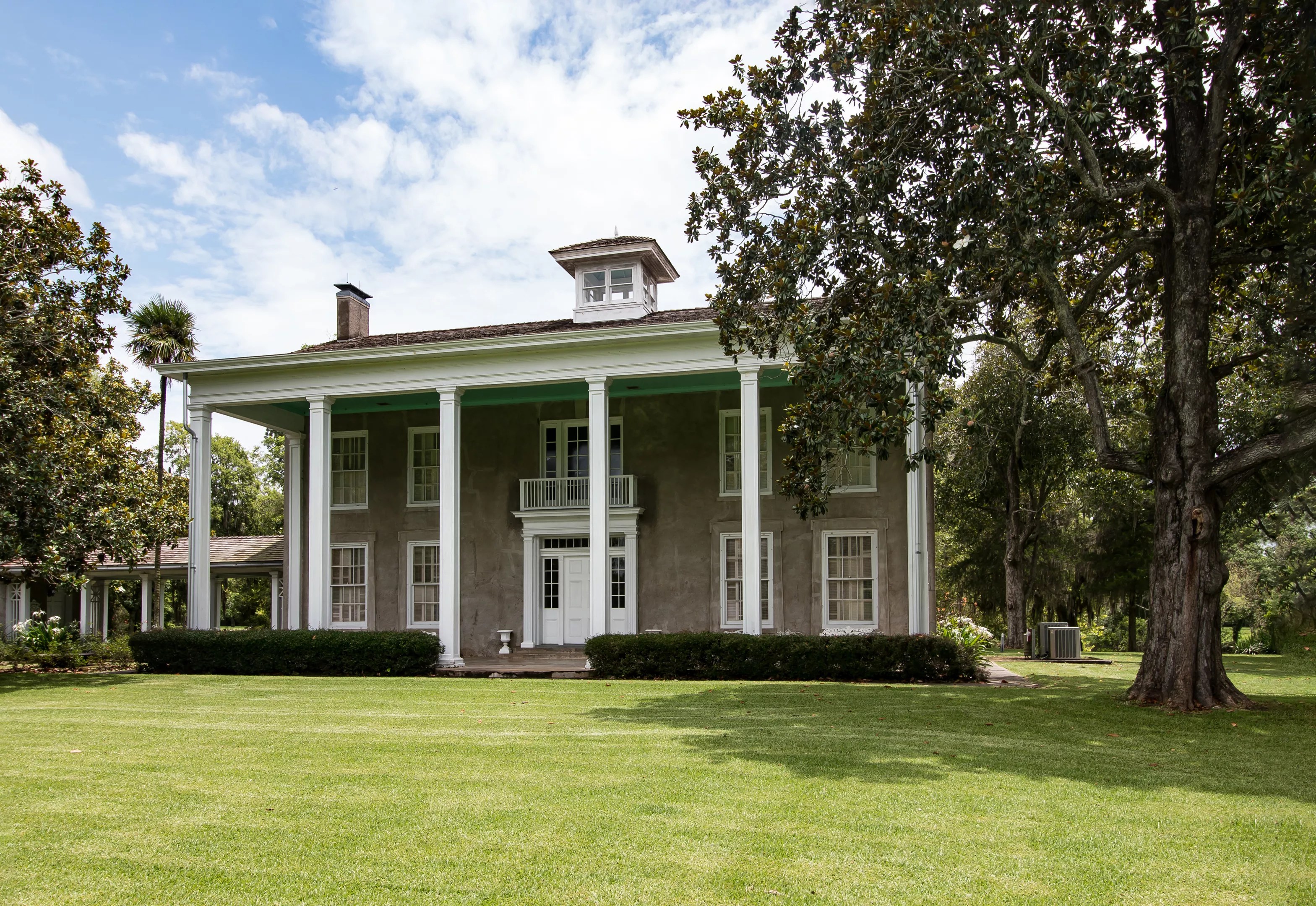
Wikipedia

Audio By Carbonatix
It almost reads like satire: A white woman launches a crusade to rid plantation gift shops of books she deems inappropriate. Well, this is Texas in 2023, y’all. Not that much surprises us anymore.
Conservatives keep widening the scope when it comes to stripping books from shelves that, for one reason or another, they find offensive. The current book-banning craze first wormed through schoolhouses and public libraries, but now it’s apparently gnawing away at some of Texas’ most hallowed historic sites.
Meet Michelle Haas, chairman of the board of the nonprofit Texas History Trust. In emails to a commissioner at the state’s historic preservation agency, she lambasted the literary offerings sold at Brazoria County historic plantations.
Works caught in Haas’ crosshairs include White Rage, which she noted in a December YouTube video was available in Varner-Hogg Plantation’s gift shop. She also mentioned titles at nearby Levi Jordan Plantation, such as Roots, an Afro-vegan cookbook and “children’s books about diversity, equity and inclusion.”
Instead of just, like, walking away and not buying the books, Haas decided to go on the offensive. And critics allege that her pressure campaign seems to have worked.
Haas celebrated some of Texas History Trust’s accomplishments in a fundraising email back in August.
“Hey… remember those politically charged books being sold to the public at state-run history sites?” the email says at one point. “Those are gone now. We worked hard to make that happen.”
Haas argues that these books have little to do with Texas or the history of the places at which they’re being sold.
Well, if dictating what titles can and cannot line the shelves of stores at state historic sites is Haas’ life mission, she certainly has her work cut out for her. How on God’s green earth did Aggie Football Legends and The Mosquito Book about, you guessed it, mosquitoes, sneak into the Iwo Jima Memorial Museum gift shop in Harlingen?
Detractors are blasting Haas’ efforts as yet another attempt by conservatives to gloss over the ugly parts of Texas history, one deeply rooted in racism.
The Observer reached out to the Texas Historical Commission to ask which, if any, books have been excised as a result of Haas’ campaign. We also asked for specifics on the book-challenge process.
An agency spokesperson confirmed via email that some titles have been removed but denied it was because of Haas’ complaints.
“However, staff removed those products to facilitate upgrades to our sites’ point-of-sale cash register system; the decision to remove a specific item was driven by poor sales or its lack of connection to the agency’s mission or the specific interpretative focus of a site,” he continued.
“Hey… remember those politically charged books being sold to the public at state-run history sites? Those are gone now. We worked hard to make that happen.” – Michelle Haas, Texas History Trust
Our follow-up question about whether specific books have bitten the dust – namely, works mentioned in Haas’ video – went unanswered. The two plantations also didn’t reply when we emailed them separately.
We do have an idea as to some of the material that Haas doesn’t approve of, though. In an email sent to a state agency commissioner and obtained by the Observer, she included a list of titles purportedly available at the Levi Jordan Plantation gift shop as of early April.

Some of the titles removed from the Plantation shop.
courtesy Amazon
Benjamin H. Johnson, a history professor at Loyola University Chicago, noted that nearly all those books are by Black authors. To him, it seems that it took only one person – out of a state population of more than 29 million – to complain, and “authorities head[ed] to the hills.”
Among professional historians, the literature on the list is considered to be credible and important, he said.
“So, to have somebody who has no professional standing, who is clearly uncomfortable with discussions of racism, come in and have this kind of apparent impact on a state agency, it’s really depressing to me,” Johnson said.
But Haas’ complaints go beyond books. She has also railed against a video about the history of Varner-Hogg that has been shown at the plantation’s visitor center.
In the video, uploaded to YouTube in 2015 and still available to view on the state agency’s website, public historian Samuel Collins III says he can “only imagine the emotions that [enslaved people] went through and the pain they felt, and the loneliness of leaving all your loved ones behind and having to start over.”
Collins, mind you, was credited in the clip as an advisory board member for the National Trust for Historic Preservation. Haas, however, is not a professional historian, by her own admission.
No matter. She seemed exceptionally bothered by this portion of the video, writing in an email to the same commissioner: “The mention of so many ‘feelings’ is ridiculous. All this Collins person does is talk about how he guesses people long dead felt.” This, she claimed, “contributes jack shit to the historical narrative.”
Well then.
We asked Haas why this was an issue for her. She replied that Collins was “projecting how he guessed [slaves] must’ve felt” before pointing us to the “final seconds of the video,” which included a brief clip from a 1936 interview with a woman who was once enslaved.
“Why speculate about how a group of people felt when freedom came when we have an actual voice from the past who tells us exactly how it felt?” Haas wrote.
Guess if we don’t have a literal former enslaved person tell us in their own words that slavery sucked, we’ll never be able to truly know whether it did.
The Texas History Trust firebrand has indeed pushed for broader access to primary sources – er, except in the case of 12 Years a Slave. Not that one.
The harrowing memoir detailing Solomon Northup’s kidnapping and enslavement was subjected to fierce scrutiny by Haas, who came out with a counter-narrative after “[s]everal years of fact checking [sic] every line” of the book. Her title? 200 Years a Fraud.
John R. Lundberg, a history professor at Tarrant County College in Fort Worth, noted that Haas is attempting to debunk firsthand accounts of slavery that have been authenticated by historians and scholars. “It’s just madness,” he said.
Lundberg is the author of a forthcoming book about slavery and Reconstruction on the Gulf Coast, to be published by Texas A&M University Press. He likened Haas’ YouTube videos to “white supremacist screeds about how academics have it all wrong.”
Haas’ book-banning charge is uber-Trumpian and “stinks of white fragility,” Lundberg said.
“It’s a part of this larger cultural moment that we’re in, in the country and in Texas, where if it hurts your feelings, it has to be banned,” he added. “And we see efforts from both the right and the left – but especially from the right – when it comes to banning books and things like that.”
Johnson and Michael Phillips, a historian at Texas A&M Commerce, filed a records request that uncovered correspondence between Haas and the commissioner.
In Texas, Phillips said, “There’s a war on history.”
Take, for example, what Phillips calls the “right-wing takeover” of the Texas State Historical Association, which is helmed by an executive director who backs a narrative of Lone Star exceptionalism. Phillips also noted that Haas gave invited testimony before The 1836 Project Advisory Committee as it worked to provide a “whitewashed version” of Texas history, summarized in pamphlet form and distributed to folks when they get their driver’s license.
Many people in power would rather erase the past, casting racism as the moral failings of a few bad apples rather than as a systemic issue, he said. Blaming it on individuals requires no heavy lifting, no broader societal restructuring.
Book bans are happening nationwide, and Florida and Texas have emerged as trend leaders, Phillips said. Looking at a map of the ongoing wave of censorship reveals that an “iron curtain of ignorance” is being drawn around the former Confederacy.
“You see those same states, over and over again, being at the forefront of issues like teen pregnancy, lack of knowledge about birth control, women’s lack of control over their bodies, income gaps between Black and white people – over and over,” Phillips said.
“The ghost of the Confederacy still haunts us,” he continued. “And that iron curtain of ignorance is being drawn over this same region that was enveloped by that curtain in 1861.”